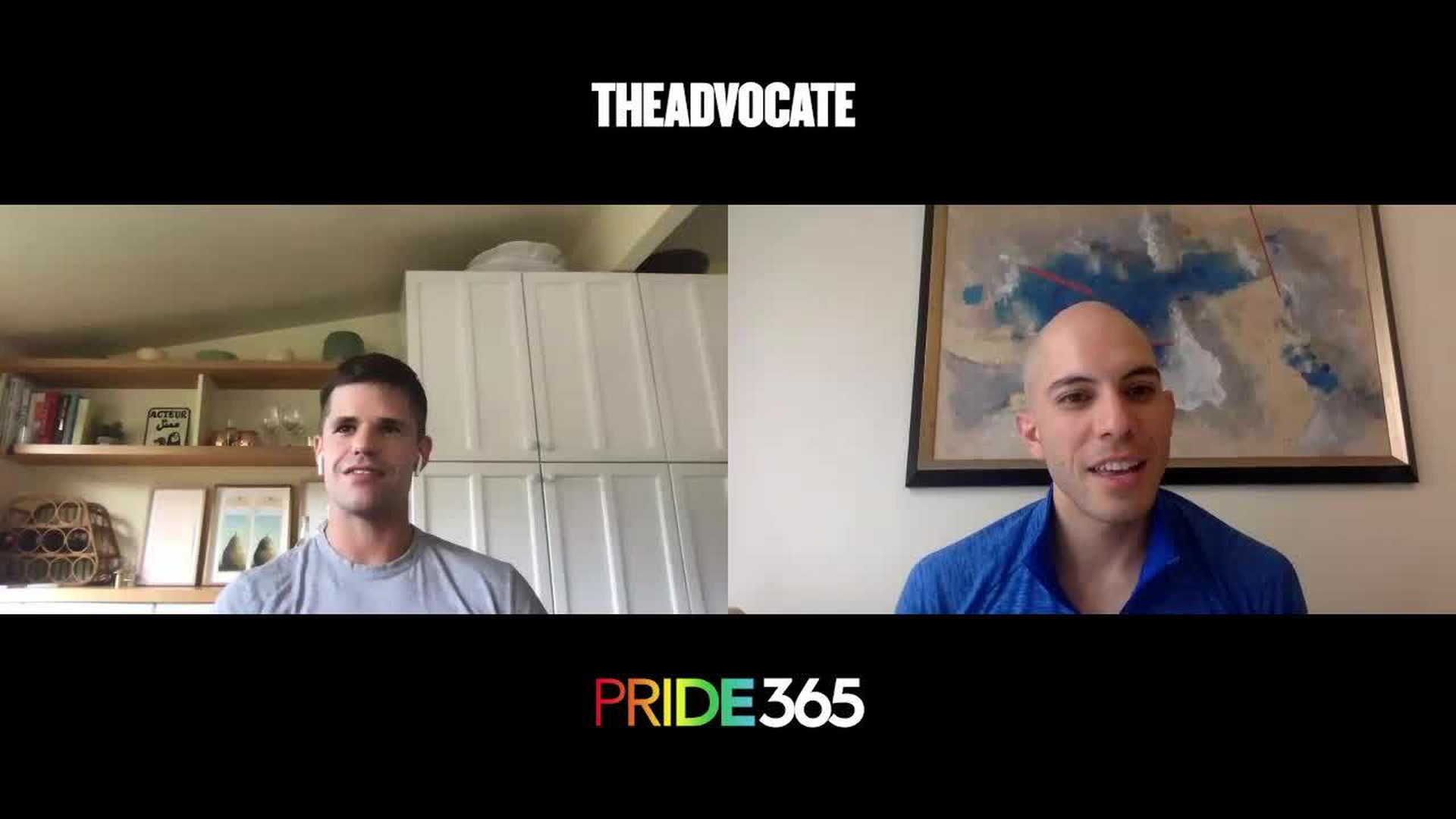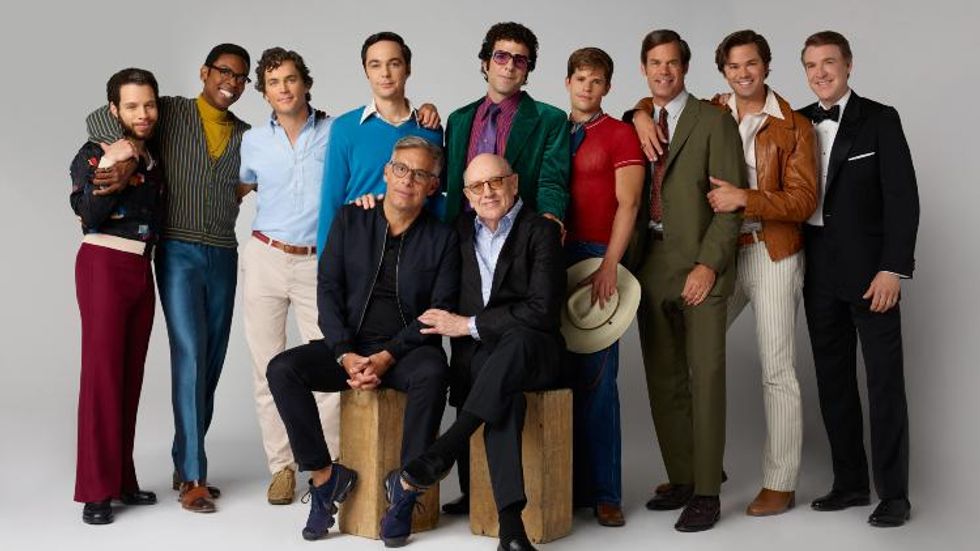When The Boys in the Band first premiered off-Broadway in 1968, it created a new genre of queer storytelling. Through the decades, while LGBTQ+ audiences have debated its themes -- mainly its unapologetic portrayal of relationships and the self-hatred among gay and bisexual men during that era -- its relevance to history cannot be overstated.
The show revived on Broadway in 2018 on its 50th anniversary, directed by Joe Mantello and starring Jim Parsons, Zachary Quinto, Andrew Rannells, Matt Bomer, Robin de Jesus, Tuc Watkins, Michael Benjamin Washington, Brian Hutchison, and Charlie Carver.
Now all the Broadway cast members have returned to their roles in a new Netflix adaptation of the Mart Crowley play, also helmed by Mantello. The film premieres September 30.
When we first see Carver in the film (he plays the hunky hustler Cowboy), he's sucking on a lollipop on a street corner in New York City's Times Square. The story is set in the late 1960s, when being gay was frowned upon by mainstream society. It was not until 1973, five years after the play premiered, that the American Psychiatric Association removed homosexuality from its list of mental disorders.
Carver, who also stars in the upcoming The Batman alongside Robert Pattinson and Zoe Kravitz, and in Netflix's Ratched alongside Sarah Paulson, Cynthia Nixon, and Judy Davis, recently sat down with The Advocate during a heat wave in Los Angeles to talk about how this year is one of the scariest but also the most rewarding yet.
"It's really the first time in 13 years that I have known the phone wasn't going to ring regarding work, because everything was so shut down," Carver says of the pandemic.
Both of Carver Netflix projects were produced by Ryan Murphy, one of the figures most responsible for advancing LGBTQ+ storytelling in television. The 32-year-old actor, who came out as gay in 2016 in a series of posts on Instagram, is proud to be part of this history.
"The feeling is just one of relief. And one of hope," he says of being part of this company of men, all of whom are trailblazers in their own right in Hollywood. "There's so much more to do in terms of representation for LGBT folks, for people of color, I mean, what have you, on [and] off camera. But I feel a sense of hope and excitement about my own career and the careers of some of my peers, that the sexuality of a character isn't necessarily what's in the foreground or what's completely backgrounded anymore. It's just one aspect of who they are. That's the kind of relationship I have with my own sexuality, my own self-identity, and to feel that reflected somehow makes me feel like I get to relax or become or recover a fuller sense of self both on camera and in my own life."
"I've felt this sort of sense of relaxing into who I am," he adds. "Not necessarily because of the work ... but because things feel like they're shifting."
Of coming out in 2016, the actor says he's "intensely grateful" for the positive response he received from fans. "I didn't know what would happen," he shares. "To have kind of other champions in this business who gave me a chance, Ryan Murphy being one of them, they saw something in me and they let me be a part of it. Then opportunities led to other opportunities ... I started kind of stepping into myself, and I believe when you do that, doors open."

Back: Robin de Jesus, Michael Benjamin Washington, Matt Bomer, Jim Parsons, Zachary Quinto, Charlie Carver, Tuc Watkins, Andrew Rannells, Brian Hutchison; front: Joe Mantello, Mart Crowley. Photography by Brian Bowen Smith/Netflix
Turning a successful play into a fully formed film isn't easy, but Carver says that the kinship he had with the cast made filming The Boys in the Band more intimate and collaborative. Still, it didn't come without challenges.
"One of the biggest things was that we didn't have an audience and therefore didn't have any laughs to play off of," he remembers. "And as a largely kind of comedic character, you know, a lot of my timing onstage was dictated by the energy exchange that was happening between me and the audience. And so to not have that and to be on a very quiet soundstage, all you really have to trust is the truth."
"It's not that you do less," he explains of executing his performance, "but you trust that you have the specific relationships to statements or history or whatever is happening in front of you. That was, for the first couple days of shooting, something to get used to. But what was really special about it too was that ... I could watch [other] performances I've seen hundreds of times onstage. ... We all got to cheer each other on because we were seeing how what we created in New York was not only getting another life, but so completely different. So completely different. And that was very exciting and encouraging to get to see in real time."
While the LGBTQ+ community has come a long way since 1968, there are still themes in the play that are relatable and remain true today.
"Some awful stuff happens in the play, and these characters are dealing with pretty difficult circumstances. Being gay in New York City in 1968 was awful," he explains. "If you risked being visible in any kind of way, you risk being arrested or named in the paper or completely rejected by society at large. So I don't want to minimize that at all, but there is a sort of quintessential queer spirit in [the film]. I've definitely had friends over with too much alcohol around and the shade starts getting thrown. And it's very funny, but it's very barbed, and sometimes it can go too far. But it's also this level of play and intimacy that I think is particular to the gay male experience, all of it, and so to see that from 50 years ago and have it feel so immediate is really heartening. It gives you a sense of something that endures."
Watch the rest of our interview above. The Boys in the Band premieres on Netflix on September 30. Ratched premieres tonight, September 18.






































































Charlie Kirk DID say stoning gay people was the 'perfect law' — and these other heinous quotes